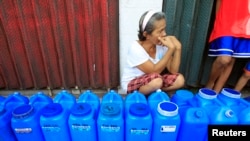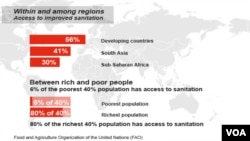A new report finds billions of people around the world still lack good sanitation and water, especially in rural areas of sub-Saharan Africa and Southeast Asia. The World Health Organization report, on behalf of an inter-agency effort called U.N.-Water, says lack of funding is hampering progress.
The new report finds two-thirds of the 94 countries surveyed have laws that recognize drinking water and sanitation as a universal human right. More than 80 percent have national policies in place for drinking water and sanitation, and more than 75 percent have policies for hygiene.
But laws and good intentions do not always translate into the desired results. The report says gains have been made in providing water and sanitation to large numbers of people. But it notes serious gaps in funding are depriving 2.5 billion men, women and children around the world from accessing basic sanitation services.
It says an additional 748 million people do not have improved drinking water and hundreds of millions of people live without clean water and soap to wash their hands.
WHO Director of the Department of Public, Environmental and Social Determinants of Health, Maria Neira, said the lack of these vital resources facilitates the spread of diarrheal diseases and many other water-borne diseases, such as cholera, typhoid and hepatitis.
“The health gains that can be obtained from investment in water and sanitation are essential - not only on diseases like diarrhea, which are so much linked to access to safe water and sanitation, but malnutrition as well," she said. "And, obviously, the newborn and maternal mortality, which is very much related to the access to safe water and sanitation facilities, other health-care facilities in the transmission of all those diseases which are associated.”
Neira said everybody demands access to clean and safe water, but sanitation is more complicated. She told VOA people often do not see the need for sanitation. If they have never been exposed to a toilet, for instance, they do not know what sanitation benefits it can bring.
The United Nations reports 82 percent of the 1.1 billion people practicing open defecation live in just 10 countries in Asia and Africa, with India accounting for more than half that number.
Dr. Neira said this practice is detrimental to human health and economic and social development. She added that the lack of water and sanitation services in schools is a huge problem, especially for girls.
“It is a question of girls not going to schools because they do not have the type of sanitation facilities they will need in order to have a minimum of privacy and respect for their own dignity and protection for their own integrity as well. This is extremely important if we want to address this barrier to better education for girls and gender issues, which are very much associated,” said Neira.
U.N. officials calculate it would cost between $5 and $20 per person to improve household sanitation. Given the large number of people who still practice open defecation, they figure it would cost roughly between $5 and $20 billion to end this practice.
The World Health Organization says this is a price well worth paying. It estimates for every dollar invested in water and sanitation, more than $4 is returned in the form of reduced health care costs for individuals and society.





